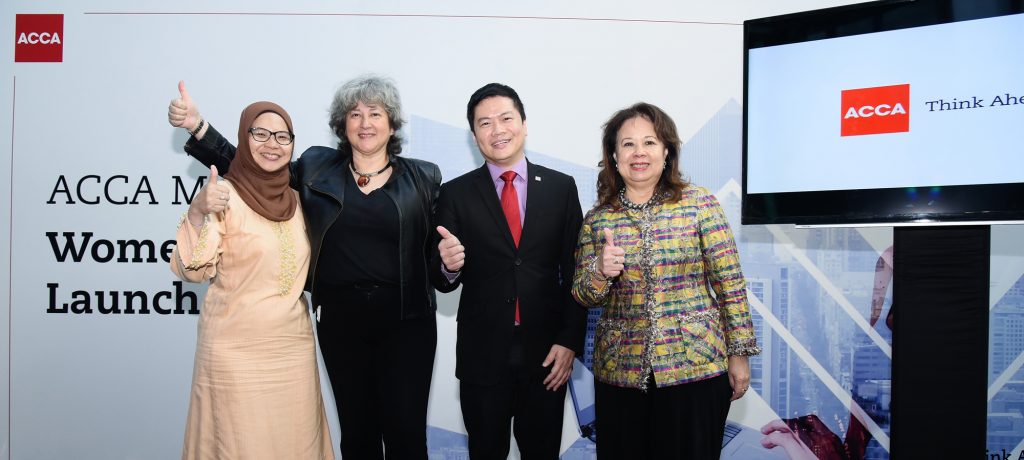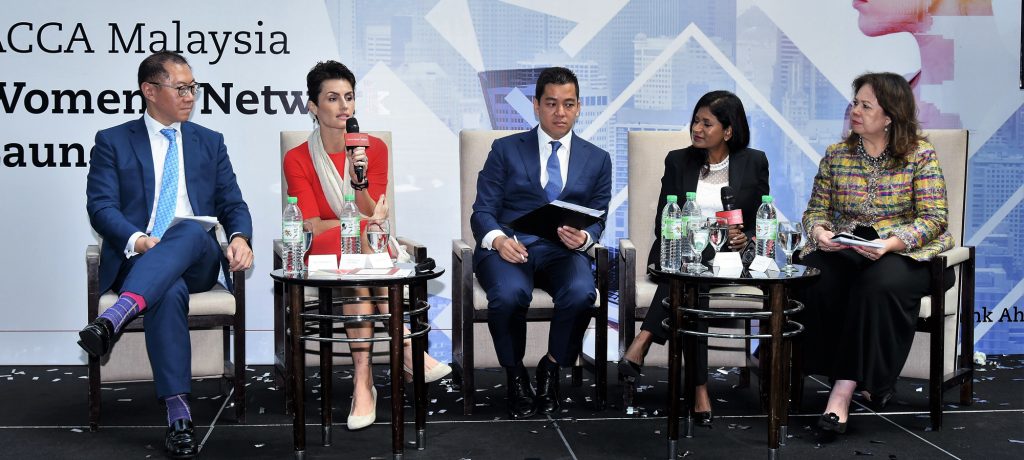
ACCA Malaysia Women’s Network offers a platform for networking, sharing insights and support for senior advancement to women who comprise 59% of its membership in Malaysia.
By ACCA
On International Women’s Day last 8 March, the ACCA Malaysia Women’s Network was officially launched. Despite the positive advances made by women in many fields, barriers still exist, Dato’ Merina Abu Tahir, president of the ACCA Malaysia Advisory Committee, said in her welcoming remarks. Urging business leaders to ‘lead the charge’ for gender pay parity and equal opportunities, Dato’ Merina acknowledged that it was imperative for ACCA to walk the talk: ‘I am proud to be part of an organisation that embraces diversity so openly and thoroughly,’ she said.
Women make up 59% of ACCA’s membership in Malaysia so it is only natural to offer a platform for networking, sharing insights and supporting women who want to take on more senior roles in the profession, Dato’ Merina pointed out. She described how the network will offer young, aspiring female ACCA members access to senior members who can act as mentors, together with programmes and networking opportunities that cater to their needs. This is important, she added, as meeting the needs of the talent pool means that the future needs of employers will also be met; recruitment strategies are thus an integral part of the diversity plan.

The guest of honour at the launch was Vicki Treadell, British high commissioner to Malaysia. As a strong advocate of women’s empowerment, she was delighted to officiate. ‘Efforts like this are in line with government policy that puts the interests of women and girls first,’ she said. ‘In the UK, we do so by ensuring that girls get the education they need to succeed in their career and life. This will create economic and business implications which will benefit the nation.
‘Women need to believe in themselves,’ she added. ‘The ACCA Malaysia Women’s Network will encourage women and raise their confidence and self-belief. When we press for progress, our motivation shouldn’t be just about us. It should be about how we create a better environment – and a better world – for all.’
The launch included a panel discussion with Datuk Alexandra Chin FCCA, network chair and ACCA past president; Jessica Macias, development director at Lean In Malaysia; Andrew Chan, consulting leader at PwC Malaysia; and Sugunah Verumandy, head of industry partnership & Malaysian professional talent at TalentCorp Malaysia.
Datuk Chin stressed the need to take a wider view and seek progress on social mobility. She pointed out that unequal access to opportunities still exists for many women – as well as men. Citing ACCA’s Open Access Policy as an example of providing equal opportunities to all, Datuk Chin said there were now more opportunities for women than ever before but ‘Women now have to be role models and create opportunities for women who come later,’ she said.
Warning that women sometimes created their own glass ceilings by waiting for things to happen rather than making them happen, Datuk Chin urged that they empower themselves to achieve their dreams, adding: ‘We shouldn’t wait for someone else to do it for us!’
ACCA: a history of firsts
In 1909, Ethel Ayres Purdie became the first female member to be admitted to a professional accountancy body: ACCA. Since then, ACCA has helped women achieve many firsts in its capacity as a professional accountancy body. ACCA’s first female president, Vera Di Palma, was also the first female president of any professional accountancy body, as was Anthea Rose, ACCA’s first female chief executive. In 2016, Datuk Alexandra Chin was the first woman from the Asia-Pacific region to become president. Today, ACCA’s chief executive is Helen Brand, who took up the position in 2008. The statistics are encouraging: 58% of ACCA’s Council members (21 out of 36), 46% of members, 56% of students and 55% of staff are women.






